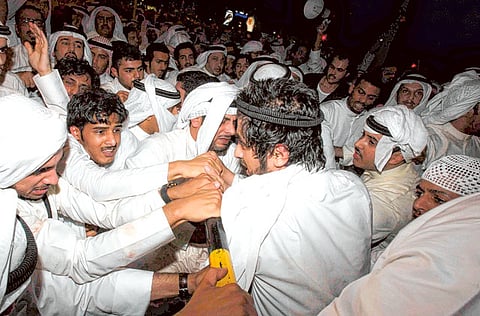Controversial elections divide Kuwait’s liberals
Boycott calls for Saturday's election forces opponents into uneasy alliances

Kuwait: The political crisis in Kuwait has caused deep divisions in society, but the most visible splits are perhaps those that have emerged within single ideological groupings.
A large number of liberals have, along with many Islamists and tribal groups, decided to boycott the elections in protest of what they see as a move towards autocracy in a country whose constitution refers to democracy and the people’s sovereignty. They oppose in particular an Emiri decree which reduced the number of candidates a voter can elect from four to one.
The move has left liberals divided. Those who have decided to vote in the elections have been baffled by what they see as the cozy partnership opposition liberals have entered with Islamists.
Since the February 2012 elections that brought in a parliament dominated by conservative opposition politicians, some liberals, largely comprising of urban families and Shiites, have come to see the government and ruling family as the last buffer against Islamisation of politics and society, and have chosen to express their sentiments at the ballot box on Saturday.
They fault pro-boycott liberals for abandoning their principles to side with Islamists who they believe are going to use democratic means to push a conservative Islamist agenda that contravenes liberal values and jeapordises individual freedoms.
Bassam Al As’ousi, member of the liberal Democratic Forum, came out strongly against other members who decided to boycott the elections, saying they have become allied with the “dark religious movement” that “wants to stage a coup against the constitution”.
“Their reference [as politicians] is not the constitution but Sharia [Islamic law],” he said, referring to Islamists. “They have called us [liberals] traitors for wanting to participate in elections but it is we who have struggled for democracy for so long.”
Haider Al Moosawi, 30, says that despite being a liberal and a democrat, he prefers an autocracy that guarantees social freedoms over a democracy that does not. The introduction of harsh blasphemy laws and the targeting of minorities, he argues, are alarming enough for liberals to keep a distance from Islamists.
He supports the opposition’s efforts to combat government corruption, but decries what he sees as its exclusionist discourse. “If the opposition did not include Islamists, I would have joined it,” he says.
Liberals who have an aversion to Islamists say the conservatives have a record of attempts to impose their agenda on society, citing as an example an attempt by Salafist MPs to amend Article 2 of the constitution from referring to Islam as “a main source” of legislation to being the “only source” of legislation. As’ousi similarly likens the Islamist-led parliamentary Committee to Combat Negative Phenomenon as a pre-cursor to the controversial religious police in Saudi Arabia.
“This is short-term thinking,” argues Ganeema Al Otaibi, an opposition activist, 29. “Do I think [a democratically elected] parliament will be representative of my views? No. But we are thinking of the next generation and the generation after.”
According to Ganeema, the opposition youth movement, seen as being the driving force behind the boycott move, has transcended ideological differences and has agreed to work together to reverse perceived autocracy. “Problems like the segregation of the sexes and the cancellation of rock concerts are not that important. Our problems are much bigger now. We are a post-ideology movement,” she says.
Those liberals who have joined the opposition see themselves as having initiated and led the reform agenda that in 2006 saw the number of electoral districts reduced from 25 to five and the number of ballots cast per voter rise from two to four. The Islamists and tribes, with their larger numbers, are simply lending a hand of support, they say.
Hamad Mufleh, 27, who identifies as a secularist liberal, dismisses the idea that the Islamists in the opposition would, with their larger numbers, hijack the reform movement with a conservative agenda.
Liberals who are not opposing the elections for fear of Islamists, he says, “are digging their own graves”. “The longer they side with this corrupt government, the more they are going to empower its Islamist adversaries, who they fear.”
The Islamists, he argues, have moderated their stance due to the ideologically pluralistic nature of the opposition they belong to. He does not rule out the prospect of a more democratic Kuwait being more conservative, but says that that may be a temporary — but necessary — price to pay for the country’s political evolution.
The divide between liberals in Kuwait is deep with little room for either party to sway. Each side very staunchly holds on to its positions, with a strong belief that their side will eventually be triumphant.


